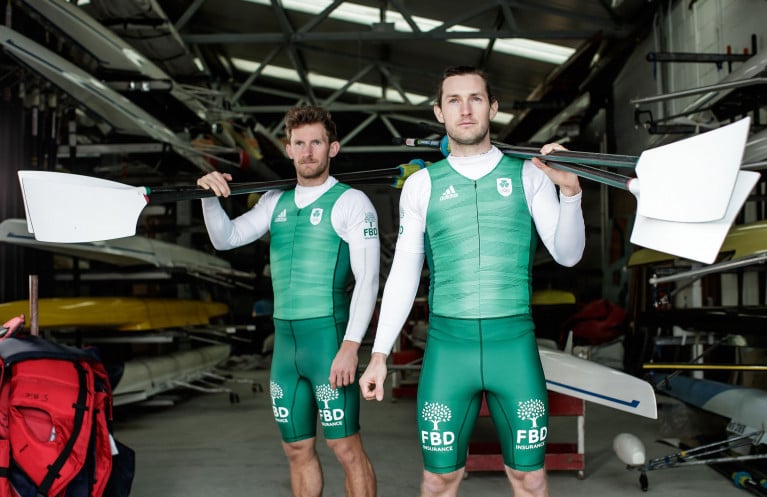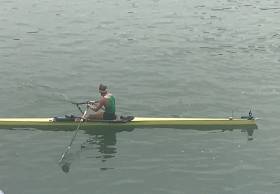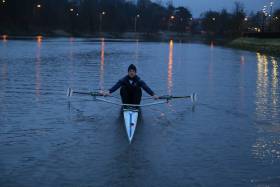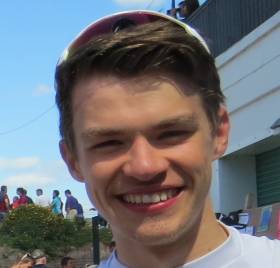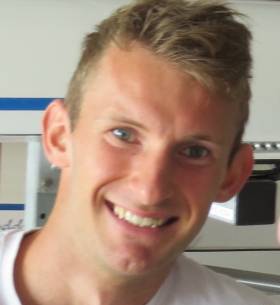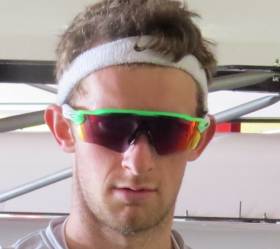Displaying items by tag: Gary O'Donovan
O'Donovans Looking Forward With Confidence
Paul O’Donovan and Gary O’Donovan, Ireland’s silver medallists from the Rio Olympic Games are taking their enforced break from competition in their stride. In an extensive interview, facilitated by Team Ireland sponsors FBD, Paul talks about finding time again for medical studies and exams, while Gary sees a bright future for Irish rowing – and revels in the joy of chasing cattle in the fields of West Cork.
Just weeks ago they came back from a training camp in Seville to find everything had changed.
“We were in the south of Spain when things were kicking off in the north of Spain,” Gary says. “We came home then fairly lively. We were advised to quarantine for two weeks after that, so we headed home to West Cork and kind of locked ourselves into a little house there and stayed away from everyone for a fortnight. The fortnight has pretty much turned into a month.
“What we really notice is how sheltered our lives [usually] are. We are not out in public that much at all. Y’know, you’d be hearing how challenging it is for all these people. I guess they’re lives are changing drastically if they’re not going into work in an office every day. Things are having to change a lot for them.
“For us, we don’t really go very far. Up to the rowing club and back home and go to the grocery store maybe once a week, twice at most.”
Paul chips in.
“[Now] we don’t go to the rowing club, we do our training here.”
The shift to a new lifestyle came in stages. First they were isolating, then the Olympic Games were postponed. When that decision eventually came, it was, says Gary, a relief. They did not have to try to do high-pressure work while obeying Government rules on movement.
“Right, the priority now is not training; it’s not the Olympics; it’s not our own ambitions and goals. The priority is now to follow the health and safety guidelines and do what’s best for the people, the same way everyone else in the public is doing it.”
“I think we’re lucky,” Paul chips in. “Although our priority is different we can still do more or less the same thing but we’re just doing it in the house because we’ve got rowing machines and a bit of weight lifting equipment. So, it doesn’t impact our training too much.”
In this year’s trials, Paul had already established himself as an immovable part of the lightweight double. Gary remained focused on winning his place in the boat. Now that the final trial is pushed forward a year or so Gary says the motivation is to retain the edge.
“With the Games so far away now, we’ve taken our foot off the gas quite a bit. We’re still doing a good bit of training. We’re very fit, very fast. To me the motivating factor is to not lose that fitness. I think it would be an awful shame to let all that training go to waste by putting a stop to the training for even a few weeks. You’d start to go backwards.
“So [we] keep chipping away at it; you do as much as you can.”
Paul’s medical studies had been put on hold. Now he can take them up again.
“I had taken break at Christmas, after my exams, but since they cancelled the Tokyo thing this (season), I got onto the Quercus scholarship (people) in UCC. They liaised with the school and they allowed me to do all the material online. I’ll sit the exams for this semester in the August sitting. They’ve been really accommodating.”
Most likely, their first international action will be in 2021. However, this week, the world governing body of rowing, Fisa, announced that they had provisionally rescheduled the European Championships, sited in Poland, for the first weekend in September.
Gary says they have no way of knowing whether they will happen, but if they do, he would love to compete.
“I’d love to race, yeh. It would be nice to go abroad if the pandemic is coming to an end. If we’re over the worst of it and we can, it would be great to go and race and have something to look forward to.”
However, the rate of recovery of different countries could make it problematic. If some crews could not get together, it could be “a bit of a mess of a regatta”. However “that could bring it back to the fundamentals of sport, really, where you just do it for sport, do it for fun”.
Apart from training, have they found other things to do?
Gary does not believe in over-thinking it. “Just wandering around the house a bit, read a book, listen to some podcasts, revise my rowing knowledge (by) doing some reading on rowing. I don’t do a whole pile – loiter about to try and pass the time.”
Being based in West Cork is an advantage.
There are amenities very close by and he can go to the strand, “or walk around the bushes, head into some lad’s animals in the field and chase them around. You could do anything, like! I love living out in the countryside.”
When they are asked for tips for others at this time, they are slow to make recommendations. Paul says people should think of themselves as staying home to save others – “my goal is to stop the spread of this virus”.
“There’s nothing else you can do at the minute (just) stop feeling sorry for yourself. That’s easy for me to say, ’cos I don’t like talking to people anyway! Gary might have better advice for the more extroverted people.”
Gary doubts that adopting a routine is practical. “Tis often very easy to lie in bed in the morning and take your leisure. They’re isn’t much wrong with that either. I’m happy enough here: get up in my own time, do my own training, and yerra, try to be a little bit productive.
“’Tis often the way that doing something small is better than doing nothing at all.”
They have thought-out – and optimistic – views on how Irish rowing has changed in the four years since their Olympic medal in 2016.
Gary talks of how it has been a process of more knowledge providing a base for those with ambition.
When they were young, they were trying to figure things out.
“In a way we didn’t really know what we were doing. We were doing the best we could. We were making the best decisions we knew how at the time. A lot of it was trial and error.
“We used to say to ourselves, and say publically, look what knowledge we have now. Jaysus, imagine what it will be like in another two years, or another four years after a lot more competition, a lot more training and a lot more racing. I think we’ve come a long way since then. We’ve got a much bigger understanding of the sport, of the training and what we do.”
Paul adds: “I think more people, when they see what we’ve done, I suppose they have a bit more belief in themselves, that if they start to commit, if they follow a programme, they see they’ll achieve as well. It becomes a bit more tangible for them. [Because] more people are able to do that, you see the team expanding.
“We’ve made mistakes along the way. And we can help younger people, fast-track them along a bit.”
Ireland had sporadic success in the 1990s and early 2000s. Niall O’Toole won a World Championships gold in 1991 and the lightweight four were fourth at the Olympic Games in 1996. There were three wins at the World Championships in 2001 and Ireland continued to have some moments in the spotlight all the way to the Olympic cycle which culminated in Beijing 2008.
Then it stopped.
“After 2008, nearly everyone quit,” Paul says. “There was a mass exodus at the top level.
“It took a long time for the people who were left to gather the knowledge of how much training needs to be done; what format of it, this kind of thing.
“Now that we’ve figured out the bones of that, it is easier to fast-track people and get them to buy into it, so that they can commit to it.
“The bit of continuity has made a big difference to the sport.”
“In Rio, myself and Paul were the only medalling crew,” Gary says. “And then Ireland started getting more medals, through the (men’s) lightweight pair and through Sanita [Puspure] and the lightweight women’s single.
“And what happens then is they start accumulating the knowledge and understanding and knowing what’s required and passing it on to more people. And then you’ve got more people involved.
“Now, you’ve got the men’s heavyweight double, the women’s pair and the women’s heavyweight four. And more clubs are getting involved.”
The knowledge is passed on.
“You’re exposing them to the sport of rowing – but you’re exposing them to success. [Success] is within arms’ reach.”
He takes the example of the women’s pair qualifying for the Olympics. They are a link to world champions, Puspure and the men’s lightweight double, but also back to clubs, where ambitious athletes can now see the way to excel. It is as if the successful crews are stepping stones, a ladder into the team and all the way to podiums at big events.
And if young rowers want to progress, “we’re willing to share knowledge”.
“We’re not sitting here saying ‘we won’t tell anyone what we’re doing because they might beat me’.”
They share information and hopefully others get better and Irish rowing and coaching in general benefits.
Gary O’Donovan believes that if anyone had said in 2014 that Ireland would win two gold medals and a silver at the 2019 World Championships and would qualify four boats for Tokyo it would have been seen as “unbelievable”.
“In the past, people would throw a year or two at it and say ‘I can’t make it, I haven’t made it, it’s impossible’. Now you can tell people: ‘this could take four years, it could take five, but if you keep chipping away and keep getting better success will come – if you do all the right things.
“In four years we’ve got all that done. What will it look like in another four years, when we have got even more knowledge?”
He believes Irish coaches have become braver. He uses the example of Dominic Casey, a club coach in Skibbereen who went all the way to guiding the O’Donovans to a medal at the Olympics.
“Club coaches can say ‘if Dominic Casey can do it, I can do it’ and their athletes are doing it.”
“Given another four years, what knowledge will Irish rowing have. In another 10 years, what knowledge will it have?
“Hopefully we can retain that and keep success going along into the future.”
Paul and Gary O'Donovan are FBD Brand Ambassadors. FBD Insurance is a principal partner to Team Ireland since September 2018. As part of its sponsorship, FBD is supporting Team Ireland’s Olympic hopefuls to enable them to focus on personal bests and breakthrough performances at the Summer Olympic Games in Tokyo which will now take place in 2021. It is this same spirit of support and protection that sees FBD as Ireland’s only homegrown insurer support more than 500,000 policyholders for over 50 years.
Gary O'Donovan Tenth Overall at World Rowing Championships
#Rowing: Ireland's Gary O'Donovan took fourth in his B Final of the lightweight single sculls at the World Rowing Championships in Linz-Ottensheim.
Rainer Kepplinger of Austria won, with O'Donovan part of group close behind. The finish puts O'Donovan 10th overall here.
Alice Arch of Australia won the women's lightweight single, with Ireland's Lydia Heaphy fifth. Heaphy had led through the first quarter.
The Ireland lightweight quadruple took second to the United States in their B Final.
World Rowing Championships, Linz-Ottensheim, Day Six (Irish interest)
Men
Lightweight Quadruple - B Final: 1 United States 6:03.94, 2 Ireland (H Sutton, M Taylor, R Ballantine, J McCarthy) 6:06.62.
Lightweight Single - B Final (places 7 to 12): 1 Austria (R Kepplinger) 7:00.16; 4
Ireland (G O'Donovan) 7:02.18.
Women
Lightweight Single - B Final (places 7 to 12): 1 Australia (Alice Arch) 7:52.59; 5 Ireland (L Heaphy) 7:55.40.
Gary O'Donovan Sprints into World Championships Semi-Final
#Rowing: Gary O'Donovan came from fifth in his quarter-final with 500 metres to go to take third and a place in the World Championships semi-finals. The good finishing speed served the Skibbereen lightweight sculler well in Linz-Ottensheim. As four boats charged, Aaron Lattimer of Canada did best and won, while Sean Murphy of Australia held on to take second. O'Donovan took out Milos Stanojevic of Serbia, who had held second going into the final quarter.
World Rowing Championships, Linz-Ottensheim, Austria, Day Four (Irish interest)
Men
Double Sculls - Quarter-Final One - (First Three to A/B Semi-Finals; rest to C/D Semi-Finals): 1 Poland 6:15.06, 2 Ireland (P Doyle, R Byrne) 6:17.78, 3 Germany 6:21.04.
Lightweight Double Sculls - Quarter-Final Three - (First Three to A/B Semi-Finals; rest to C/D Semi-Finals): 1 Ireland (F McCarthy, P O'Donovan) 6:20.84, 2 Spain 6:22.84, 3 Poland 6:23.72.
Lightweight Single Sculls - Quarter Final Three - (First Three to A/B Semi-Finals; rest to C/D Semi-Finals): 1 Canada (A Lattimer) 6:56.90, 2 2 Australia (S Murphy) 6:57.85, 3 Ireland (G O'Donovan) 6:59.57.
Women
Pair - Quarter-Final Two (First Three to A/B Semi-Finals; rest to C/D Semi-Finals): 1 Australia 7:08.74, 2 Ireland (A Crowley, M Dukarska) 7:12.51, 3 Italy 7:13.11.
Lightweight Double Sculls - Quarter-Final Three - (First Three to A/B Semi-Finals; rest to C/D Semi-Finals): 4 Ireland (A Casey, D Walsh) 7:07.17.
Single Sculls - Quarter-Final Four - (First Three to A/B Semi-Finals; rest to C/D Semi-Finals): 1 Ireland (S Puspure) 7:21.03, 2 Czech Republic (M Topinkova Knapkova) 7:36.19, 3 Ukraine (D Dymchenko) 7:41.48.
Pararowing: Women's PR Two Single Sculls, Preliminary Race: 1 Australia (K Ross) 9:24.99; 3 Ireland (K O'Brien) 9:52.13.
#Rowing: Gary O’Donovan won his repechage to take his place in the quarter finals of the lightweight single sculls at the World Rowing Championships in Linz in Austria.
The Skibbereen man made the race his own from early on, leaving his rivals behind and winning from Uncas Batista of Brazil, who took the second qualifying spot in the quarter finals.
World Rowing Championships, Linz, Austria, Day Two (Irish interest)
Men
Pair - Repechage Two (First Two to Quarter-Finals; Third to Final E): 1 Chile 6:43.70, 2 Greece 6:43.71; 3 Ireland (M O’Donovan, S O’Driscoll) 6:44.35.
Lightweight Quadruple – Heat One (Winner to A Final; rest to Repechage): 4 Ireland (H Sutton, M Taylor, R Ballantine, J McCarthy) 6:04.84
Lightweight Single Sculls – Repechage Two (First Two to Quarter-Finals; rest to E/F Semi-Finals): 1 Ireland (G O’Donovan) 7:28.07, 2 Brazil (U Batista) 7:32.97.
Gary O'Donovan Stops and Misses Out on First Chance of Qualification Place at World Championships
#Rowing: The two Ireland lightweight single scullers missed out on qualification from their heats at the World Rowing Championships – but in different fashions. Lydia Heaphy held the second and final qualification spot for the semi-final through much of her race only to be caught coming up to the line by Martine Veldhuis of the Netherlands. Heaphy missed out by just .3 of a second in a race won by Marie-Louise Draeger of Germany.
Gary O’Donovan was in fifth place in his heat of the lightweight single at 1,000 metres and seemed in striking distance of a top-three place which would have sent him to the quarter-finals. However, he stopped and then paddled home fourth. He will have to come through a repechage to secure a place in the quarter-finals.
World Rowing Championships, Linz, Austria, Day One (Irish interest)
Men
Pair – Heat One (First Four to Quarter-Finals; rest to Repechage): 6 Ireland (M O’Donovan, S O’Driscoll) 6:50.51.
Lightweight Double Sculls – Heat Three (First Three to Quarter-Finals; rest to Repechage): 1 Ireland (F McCarthy, P O’Donovan) 6:28.02
Lightweight Single Sculls – Heat Four (First Three to Quarter-Finals; rest to Repechage): 4 Ireland (G O’Donovan) 8:06.49.
Women
Four – Heat One (First Two to A/B Semi-Finals; rest to Repechage): 3 Ireland (T Hanlon, E Lambe, A Keogh, E Hegarty) 6:44.72.
Pair – Heat Four (First Four to Quarter-Finals; rest to Repechage): 2 Ireland (A Crowley, M Dukarska) 7:13.30
Lightweight Double Sculls – Heat Four (First Four to Quarter-Finals; rest to Repechage): 4 Ireland (A Casey, D Walsh) 7:25.62.
Lightweight Single Sculls – Heat Three (First Two to A/B Semi-Finals; rest to Repechage): 3 Ireland (L Heaphy) 8:01.79.
Irish Crews Progress to A Finals at World Cup Regatta
#Rowing: Ireland took three A Final places from their first three races at the World Cup Regatta in Rotterdam this morning.
Philip Doyle and Ronan Byrne, the Ireland men's double, won their race. They took the lead and held it right through. Germany were their closest challengers, while Australia One finished well to to take the third qualification place.
The Ireland women's pair of Monika Dukarska and Aileen Crowley and lightweight single sculler Gary O'Donovan also qualified for A Finals.
The pair took the race to the other crews and led at 1500 metres. Spain and Romania covered the final 500 metres with real pace, but while Romania passed Ireland to win, Dukarska and Crowley came home ahead of Spain, who took the third qualification spot.
Gary O'Donovan finished fast in the semi-final to take second. He had been third for much of the contest. However, Jake McCarthy fell just short, taking fourth. He is set for a B Final.
#Rowing: Paul O’Donovan will team up with Fintan McCarthy in the lightweight double at the World Cup Regatta in Rotterdam, the Netherlands, from July 12th to 14th. Gary O’Donovan and Jake McCarthy will compete in lightweight singles.
World and European champion Sanita Puspure will hope to continue her winning run in the single. Monika Dukarska and Aileen Crowley form a pair and Denise Walsh and Lydia Heaphy will compete again in the lightweight double, as will Ronan Byrne and Philip Doyle in the men’s openweight double.
Ireland Crews for World Rowing Cup Three, Rotterdam, July 12th to 14th
Men
Double: R Byrne, P Doyle
Lightweight Double: F McCarthy, P O’Donovan
Lightweight Singles: G O’Donovan; J McCarthy
Women
Pair: M Dukarska, A Crowley
Single: S Puspure
Lightweight Double: D Walsh, L Heaphy
#Rowing: Gary and Paul O'Donovan, the world champions in the lightweight double, won a key race at the Ireland trials today. Fintan and Jake McCarthy were two lengths behind the O'Donovans with 400 metres to go, but tightened it to a length on the line. The trials go on, with tests of different combinations.
Conditions at the National Rowing Centre were remarkably good.
#Rowing: Gary O’Donovan had to settle for fourth in his C Final of the lightweight single sculls at the European Rowing Championships today. Rainer Kepplinger of Austria led for virtually the entire race and won well. O’Donovan, along with Eleftherios Konsolas of Greece and Filip Nilsson of Sweden fought out their own battle in the final 500 metres, but the Greek and Swede took the second and third places with O’Donovan dropping back to fourth of five. He finished 16th overall.
European Championships, Lucerne, Day Two (Irish interest)
Men
Lightweight Double Sculls – C Final (Places 13 to 17): 1 Austria (R Kepplinger) 7:09.42; 4 Ireland (G O’Donovan) 7:18.11.
#Rowing: Gary O’Donovan took fourth place, one slot outside the qualifying spots for the semi-finals, in his repechage at the European Rowing Championships in Lucerne today. Norway, Turkey and Serbia battled it out at the head of the field and took the top three spots in that order. O’Donovan finished well but the Skibbereen man was just under two seconds off the key places. He will compete in the C Final.
European Championships, Lucerne, Day One (Irish interest)
Men
Double Sculls – Heat One (First Two to A/B Semi-Finals; rest to Repechages): 1 Ireland (P Doyle, R Byrne) 6:26.53, 2 Romania 6:29.62.
Lightweight Double Sculls – Heat Two (First Two to A/B Semi-Finals; rest to Repechages): 1 Italy (S Oppo, P Ruta) 6:14.73, 2 Ireland (J McCarthy, F McCarthy) 6:16.07; 3 Ukraine 6:16.32.
Lightweight Single Sculls – Heat One (First Two to A/B Semi-Finals; rest to Repechages): 1 Italy (M Goretti) 7:05.54, 2 Switzerland (J Schaeuble) 7:06.73; 6 Ireland (G O’Donovan) 7:34.73.
Repechage One (First Three to A/B Semi-Finals; rest to C Final): 1 Norway 6:59.05, 2 Turkey 6:59.90, 3 Serbia 7:02.29; 4 Ireland (O’Donovan) 7:04.16.
Women
Single Sculls – Heat Three (First Two to A/B Semi-Finals; rest to Repechages): 1 Ireland (S Puspure) 7:30.65, Britain (V Thornley) 7:35.35
Lightweight Double Sculls – Heat Three (First Three to A/B Semi-Finals; rest to Repechages): 1 Switzerland 6:57.58, 2 Britain 6:58.61, 3 Ireland (D Walsh, L Heaphy) 7:14.55.


























